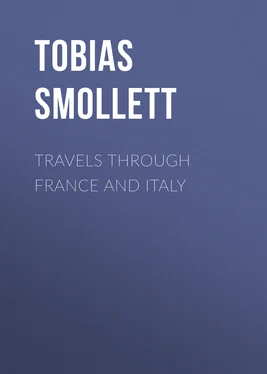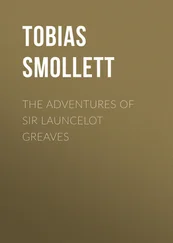Tobias Smollett - Travels through France and Italy
Здесь есть возможность читать онлайн «Tobias Smollett - Travels through France and Italy» — ознакомительный отрывок электронной книги совершенно бесплатно, а после прочтения отрывка купить полную версию. В некоторых случаях можно слушать аудио, скачать через торрент в формате fb2 и присутствует краткое содержание. Жанр: Путешествия и география, История, foreign_edu, foreign_antique, foreign_prose, на английском языке. Описание произведения, (предисловие) а так же отзывы посетителей доступны на портале библиотеки ЛибКат.
- Название:Travels through France and Italy
- Автор:
- Жанр:
- Год:неизвестен
- ISBN:нет данных
- Рейтинг книги:5 / 5. Голосов: 1
-
Избранное:Добавить в избранное
- Отзывы:
-
Ваша оценка:
- 100
- 1
- 2
- 3
- 4
- 5
Travels through France and Italy: краткое содержание, описание и аннотация
Предлагаем к чтению аннотацию, описание, краткое содержание или предисловие (зависит от того, что написал сам автор книги «Travels through France and Italy»). Если вы не нашли необходимую информацию о книге — напишите в комментариях, мы постараемся отыскать её.
Travels through France and Italy — читать онлайн ознакомительный отрывок
Ниже представлен текст книги, разбитый по страницам. Система сохранения места последней прочитанной страницы, позволяет с удобством читать онлайн бесплатно книгу «Travels through France and Italy», без необходимости каждый раз заново искать на чём Вы остановились. Поставьте закладку, и сможете в любой момент перейти на страницу, на которой закончили чтение.
Интервал:
Закладка:
Three experiences Smollett had at this season which may well fall to the lot of road-farers in France right down to the present day. He was poisoned with garlic, surfeited with demi-roasted small birds, and astonished at the solid fare of the poorest looking travellers. The summer weather, romantic scenery, and occasional picnics, which Smollett would have liked to repeat every summer under the arches of the Pont du Gard—the monument of antiquity which of all, excepting only the Maison Carree at Nimes, most excited his enthusiastic admiration, all contributed to put him into an abnormally cheerful and convalescent humour. . . .
Smollett now bent his steps southwards to Montpellier. His baggage had gone in advance. He was uncertain as yet whether to make Montpellier or Nice his headquarters in the South. Like Toulouse and Tours, and Turin, Montpellier was for a period a Mecca to English health and pleasure seekers abroad. A city of no great antiquity, but celebrated from the twelfth century for its schools of Law and Physic, it had been incorporated definitely with France since 1382, and its name recurs in French history both as the home of famous men in great number and as, before and after the brief pre-eminence of La Rochelle, the rival of Nimes as capital of Protestantism in the South. Evelyn, Burnet, the two Youngs, Edward and Arthur, and Sterne have all left us an impression of the city. Prevented by snow from crossing the Mont Cenis, John Locke spent two winters there in the days of Charles II. (1675-77), and may have pondered a good many of the problems of Toleration on a soil under which the heated lava of religious strife was still unmistakeable. And Smollett must almost have jostled en route against the celebrated author of The Wealth of Nations, who set out with his pupil for Toulouse in February 1764. A letter to Hume speaks of the number of English in the neighbourhood just a month later. Lomenie de Brienne was then in residence as archbishop. In the following November, Adam Smith and his charge paid a visit to Montpellier to witness a pageant and memorial, as it was supposed, of a freedom that was gone for ever, the opening of the States of Languedoc. Antiquaries and philosophers went to moralise on the spectacle in the spirit in which Freeman went to Andorra, Byron to the site of Troy, or De Tocqueville to America. It was there that the great economist met Horne Tooke.
Smollett's more practical and immediate object in making this pilgrimage was to interview the great lung specialist, known locally to his admiring compatriots as the Boerhaave of Montpellier, Dr. Fizes. The medical school of Montpellier was much in evidence during the third quarter of the eighteenth century, and for the history of its various branches there are extant numerous Memoires pour Servir, by Prunelle, Astruc, and others. Smollett was only just in time to consult the reigning oracle, for the "illustrious" Dr. Fizes died in the following year. He gives us a very unfavourable picture of this "great lanthorn of medicine," who, notwithstanding his prodigious age, his stoop, and his wealth, could still scramble up two pairs for a fee of six livres. More than is the case with most medical patients, however, should we suspect Smollett of being unduly captious. The point as to how far his sketch of the French doctor and his diagnosis was a true one, and how far a mere caricature, due to ill health and prejudice, has always piqued my curiosity. But how to resolve a question involving so many problems not of ordinary therapeutic but of historical medicine! In this difficulty I bethought me most fortunately of consulting an authority probably without a rival in this special branch of medical history, Dr. Norman Moore, who with his accustomed generosity has given me the following most instructive diagnosis of the whole situation.
"I have read Smollett's account of his illness as it appears in several passages in his travels and in the statement which he drew up for Professor 'F.' at Montpellier.
"Smollett speaks of his pulmonic disorder, his 'asthmatical disorder,' and uses other expressions which show that his lungs were affected. In his statement he mentions that he has cough, shortness of breath, wasting, a purulent expectoration, loss of appetite at times, loss of strength, fever, a rapid pulse, intervals of slight improvement and subsequent exacerbations.
"This shortness of breath, he says, has steadily increased. This group of symptoms makes it certain that he had tuberculosis of the lungs, in other words, was slowly progressing in consumption.
"His darting pains in his side were due to the pleurisy which always occurs in such an illness.
"His account shows also the absence of hopelessness which is a characteristic state of mind in patients with pulmonary tuberculosis.
"I do not think that the opinion of the Montpellier professor deserves Smollett's condemnation. It seems to me both careful and sensible and contains all the knowledge of its time. Smollett, with an inconsistency not uncommon in patients who feel that they have a serious disease, would not go in person to the Professor, for he felt that from his appearance the Professor would be sure to tell him he had consumption. He half hoped for some other view of the written case in spite of its explicit statements, and when Professor F— wrote that the patient had tubercles in his lungs, this was displeasing to poor Smollett, who had hoped against hope to receive—some other opinion than the only possible one, viz., that he undoubtedly had a consumption certain to prove fatal."
The cruel truth was not to be evaded. Smollett had tuberculosis, though not probably of the most virulent kind, as he managed to survive another seven years, and those for the most part years of unremitting labour. He probably gained much by substituting Nice for Montpellier as a place to winter in, for although the climate of Montpellier is clear and bright in the highest degree, the cold is both piercing and treacherous. Days are frequent during the winter in which one may stand warmly wrapped in the brilliant sun and feel the protection of a greatcoat no more than that of a piece of gauze against the icy and penetrating blast that comes from "the roof of France."
Unable to take the direct route by Arles as at present, the eastward-bound traveller from Montpellier in 1764 had to make a northerly detour. The first stone bridge up the Rhone was at Avignon, but there was a bridge of boats connecting Beaucaire with Tarascon. Thence, in no very placable mood, Smollett set out in mid-November by way of Orgon [Aix], Brignolles and le Muy, striking the Mediterranean at Frejus. En route he was inveigled into a controversy of unwonted bitterness with an innkeeper at le Muy. The scene is conjured up for us with an almost disconcerting actuality; no single detail of the author's discomfiture is omitted. The episode is post-Flaubertian in its impersonal detachment, or, as Coleridge first said, "aloofness." On crossing the Var, the sunny climate, the romantic outline of the Esterelles, the charms of the "neat village" of Cannes, and the first prospect of Nice began gradually and happily to effect a slight mitigation in our patient's humour. Smollett was indubitably one of the pioneers of the Promenade des Anglais. Long before the days of "Dr. Antonio" or Lord Brougham, he described for his countrymen the almost incredible dolcezza of the sunlit coast from Antibes to Lerici. But how much better than the barren triumph of being the unconscious fugleman of so glittering a popularity must have been the sense of being one of the first that ever burst from our rude island upon that secluded little Piedmontese town, as it then was, of not above twelve thousand souls, with its wonderful situation, noble perspective and unparalleled climate. Well might our travel-tost doctor exclaim, "When I stand on the rampart and look around I can scarce help thinking myself enchanted." It was truly a garden of Armida for a native of one of the dampest corners of North Britain.
Читать дальшеИнтервал:
Закладка:
Похожие книги на «Travels through France and Italy»
Представляем Вашему вниманию похожие книги на «Travels through France and Italy» списком для выбора. Мы отобрали схожую по названию и смыслу литературу в надежде предоставить читателям больше вариантов отыскать новые, интересные, ещё непрочитанные произведения.
Обсуждение, отзывы о книге «Travels through France and Italy» и просто собственные мнения читателей. Оставьте ваши комментарии, напишите, что Вы думаете о произведении, его смысле или главных героях. Укажите что конкретно понравилось, а что нет, и почему Вы так считаете.












